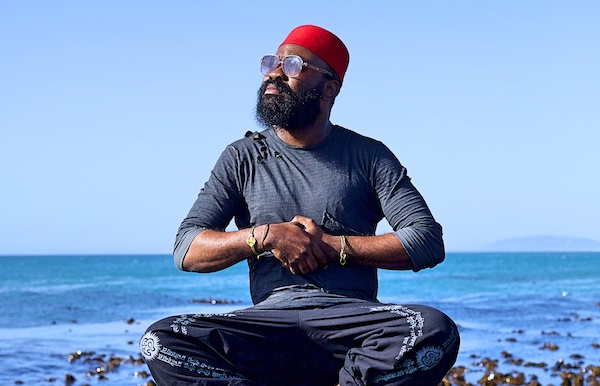Jan 13, 2026 2:09 PM
More Trump-Kennedy Center Cancellations
The fallout from the renaming of the John F. Kennedy Center for the Performing Arts to include President Donald…

Nduduzo Makhathini is among the 25 artists DownBeat thinks will help shape jazz in the decades to come.
(Photo: Ezra Makgope)When he was 17, pianist Nduduzo Makhathini discovered jazz and realized that this was the door he had been seeking. Before that epiphany, music from his homeland, South Africa, had been his inspiration.
Then, when he began studying Western music formally in 2001, he picked up a book of Charlie Parker tunes. This led him to check out John Coltrane’s A Love Supreme from a library.
“Hearing the first track, ‘Acknowledgement,’ where Elvin Jones comes in and plays the groove and then does variations on it, I realized this same feeling was also in my country’s music,” Makhathini said. “The traditional Zulu music of indlamu is based on that same triplet that Elvin plays. The melody of ‘Resolution’ almost evokes the ancient style of Zulu singing called amahubo, which was popularized by Princess Magogo. So, the music I grew up singing in traditional ceremonies and rituals was already jazz in a certain way.”
Since then, Makhathini has made it his mission to bridge his musical DNA with what he calls “the American jazz narrative.”
His explorations are traceable through a handful of albums released since 2014, most on his own label, Gundu. Blue Note released his latest disc, Modes Of Communication: Letters From The Underworlds, on April 3. The musicians assembled for that album share Makhathini’s immersion in South African culture (except for the American-born alto saxophonist Logan Richardson). The recording sessions presented an opportunity for rich cross-cultural connections.
As head of the music department at South Africa’s University of Fort Hare, Makhathini bases his curriculum on the concept of music moving back and forth across cultural bridges. “I try to push for a new option that encompasses the ways in which people understand music locally. We call it the ‘decolonial project,’ where we look for creative ways to open a plurality in how people learn music. Yes, jazz was born in America, and as such, it borrows from Western art music. But in an African context, you also have to pay attention to your upbringing and the things you already know that can inform your way of finding your sound.” DB
This story originally was published in the November 2020 issue of DownBeat. Subscribe here.

Belá Fleck during an interview with Fredrika Whitfield on CNN.
Jan 13, 2026 2:09 PM
The fallout from the renaming of the John F. Kennedy Center for the Performing Arts to include President Donald…

Peplowski first came to prominence in legacy swing bands, including the final iteration of the Benny Goodman Orchestra, before beginning a solo career in the late 1980s.
Feb 3, 2026 12:10 AM
Ken Peplowski, a clarinetist and tenor saxophonist who straddled the worlds of traditional and modern jazz, died Feb. 2…

The success of Oregon’s first album, 1971’s Music Of Another Present Era, allowed Towner to establish a solo career.
Jan 19, 2026 5:02 PM
Ralph Towner, a guitarist and composer who blended multiple genres, including jazz — and throughout them all remained…

Rico’s Anti-Microbial Instrument Swab
Jan 19, 2026 2:48 PM
With this year’s NAMM Show right around the corner, we can look forward to plenty of new and innovative instruments…

Richie Beirach was particularly renowned for his approach to chromatic harmony, which he used to improvise reharmonizations of originals and standards.
Jan 27, 2026 11:19 AM
Richie Beirach, a pianist and composer who channeled a knowledge of modern classical music into his jazz practice,…